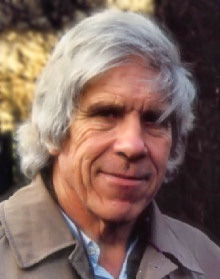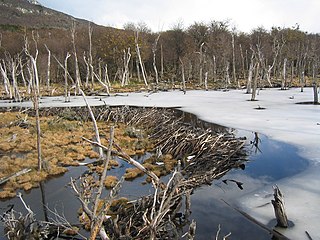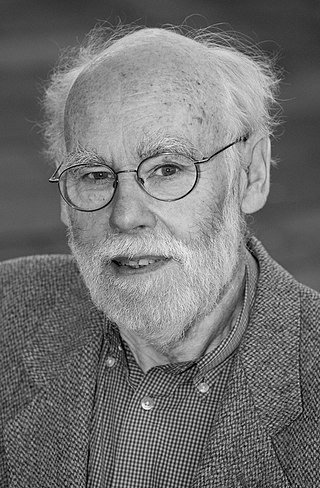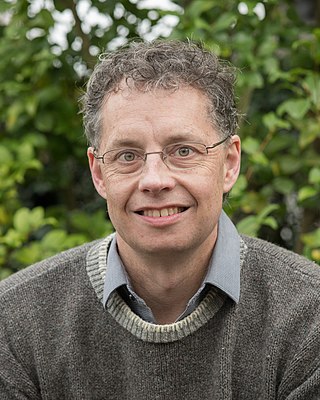
John Maynard Smith was a British theoretical and mathematical evolutionary biologist and geneticist. Originally an aeronautical engineer during the Second World War, he took a second degree in genetics under the well-known biologist J. B. S. Haldane. Maynard Smith was instrumental in the application of game theory to evolution with George R. Price, and theorised on other problems such as the evolution of sex and signalling theory.

William Donald Hamilton was a British evolutionary biologist, recognised as one of the most significant evolutionary theorists of the 20th century.

The handicap principle is a hypothesis proposed by the Israeli biologist Amotz Zahavi to explain how evolution may lead to "honest" or reliable signalling between animals which have an obvious motivation to bluff or deceive each other.
Fisher's fundamental theorem of natural selection is an idea about genetic variance in population genetics developed by the statistician and evolutionary biologist Ronald Fisher. The proper way of applying the abstract mathematics of the theorem to actual biology has been a matter of some debate.

George Christopher Williams was an American evolutionary biologist.
The Major Transitions in Evolution is a book written by John Maynard Smith and Eörs Szathmáry.

Niche construction is the process by which an organism alters its own local environment. These alterations can be a physical change to the organism’s environment or encompass when an organism actively moves from one habitat to another to experience a different environment. Examples of niche construction include the building of nests and burrows by animals, and the creation of shade, influencing of wind speed, and alternation of nutrient cycling by plants. Although these alterations are often beneficial to the constructor, they are not always.
David C. Page is an American biologist and professor at the Massachusetts Institute of Technology (MIT), the director of the Whitehead Institute, and a Howard Hughes Medical Institute (HHMI) investigator. He is best known for his work on mapping the Y-chromosome and on its evolution in mammals and expression during development. He was cited by Bryan Sykes in Adam's Curse: A Future Without Men.

The two-empire system was the top-level biological classification system in general use before the establishment of the three-domain system. It classified cellular life into Prokaryota and Eukaryota as either "empires" or "superkingdoms". When the three-domain system was introduced, some biologists preferred the two-superkingdom system, claiming that the three-domain system overemphasized the division between Archaea and Bacteria. However, given the current state of knowledge and the rapid progress in biological scientific advancement, especially due to genetic analyses, that view has all but vanished.

Brian Charlesworth is a British evolutionary biologist at the University of Edinburgh, and editor of Biology Letters. Since 1997, he has been Royal Society Research Professor at the Institute of Evolutionary Biology (IEB) in Edinburgh. He has been married since 1967 to the British evolutionary biologist Deborah Charlesworth.
Joan Roughgarden is an American ecologist and evolutionary biologist. She has engaged in theory and observation of coevolution and competition in Anolis lizards of the Caribbean, and recruitment limitation in the rocky intertidal zones of California and Oregon. She has more recently become known for her rejection of sexual selection, her theistic evolutionism, and her work on holobiont evolution.

Sunetra Gupta is an Indian-born British infectious disease epidemiologist and a professor of theoretical epidemiology at the Department of Zoology, University of Oxford. She has performed research on the transmission dynamics of various infectious diseases, including malaria, influenza and COVID-19, and has received the Scientific Medal of the Zoological Society of London and the Rosalind Franklin Award of the Royal Society. She is a member of the scientific advisory board of Collateral Global, an organisation which examines the global impact of COVID-19 restrictions.

Lysine-specific demethylase 6A also known as Ubiquitously transcribed tetratricopeptide repeat, X chromosome (UTX), is a protein which in humans is encoded by the KDM6A gene. It belongs to the 2-oxoglutarate (2OG)-dependent dioxygenase superfamily.
Paul H. Harvey is a British evolutionary biologist. He is Professor of Zoology and was head of the zoology department at the University of Oxford from 1998 to 2011 and Secretary of the Zoological Society of London from 2000 to 2011, holding these posts in conjunction with a professorial fellowship at Jesus College, Oxford.

"Precambrian rabbits" or "fossil rabbits in the Precambrian" are reported to have been among responses given by the biologist J. B. S. Haldane when asked what evidence could destroy his confidence in the theory of evolution and the field of study. The answers became popular imagery in debates about evolution and the scientific field of evolutionary biology in the 1990s. Many of Haldane's statements about his scientific research were popularized in his lifetime.

Carl Theodore Bergstrom is a theoretical and evolutionary biologist and a professor at the University of Washington in Seattle, Washington, United States. Bergstrom is a critic of low-quality or misleading scientific research. He is the co-author of a book on misinformation called Calling Bullshit: The Art of Skepticism in a Data-Driven World and teaches a class by the same name at University of Washington.
Montgomery Wilson Slatkin is an American biologist, and professor at University of California, Berkeley.
The eggNOG database is a database of biological information hosted by the EMBL. It is based on the original idea of COGs and expands that idea to non-supervised orthologous groups constructed from numerous organisms. The database was created in 2007 and updated to version 4.5 in 2015. eggNOG stands for evolutionary genealogy of genes: Non-supervised Orthologous Groups.

Peter D. Keightley FRS is Professor of Evolutionary Genetics at the Institute of Evolutionary Biology in School of Biological Sciences at the University of Edinburgh.
The extended evolutionary synthesis consists of a set of theoretical concepts argued to be more comprehensive than the earlier modern synthesis of evolutionary biology that took place between 1918 and 1942. The extended evolutionary synthesis was called for in the 1950s by C. H. Waddington, argued for on the basis of punctuated equilibrium by Stephen Jay Gould and Niles Eldredge in the 1980s, and was reconceptualized in 2007 by Massimo Pigliucci and Gerd B. Müller. Notably, Dr. Müller concluded from this research that Natural Selection has no way of explaining speciation, saying: “selection has no innovative capacity...the generative and the ordering aspects of morphological evolution are thus absent from evolutionary theory.”











